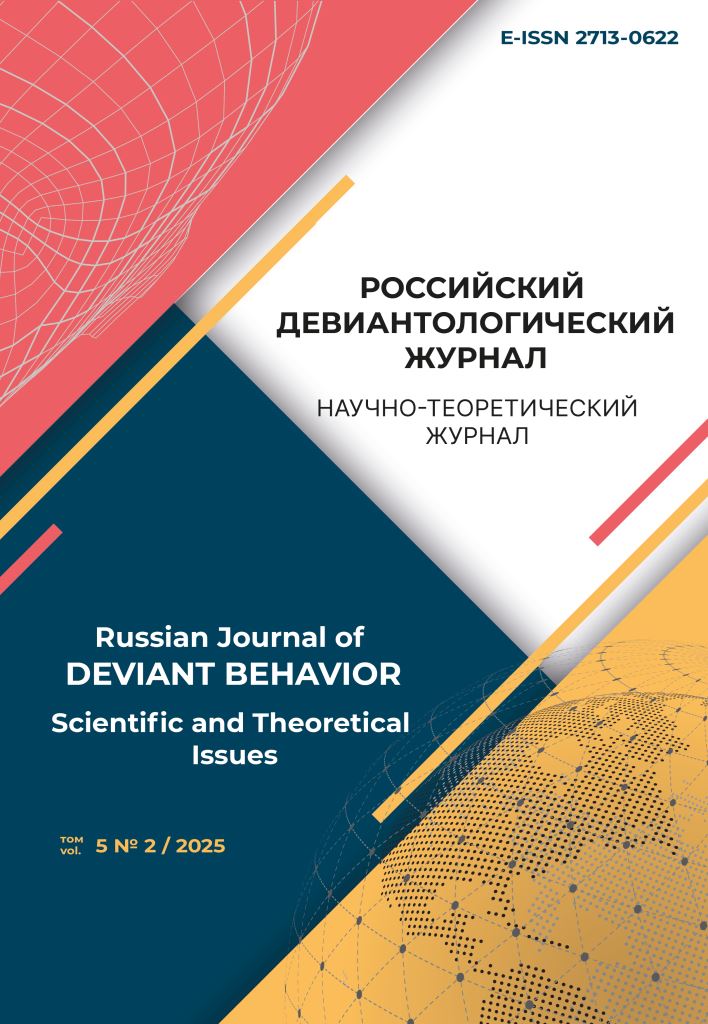employee from 01.01.2020 until now
Chelyabinsk, Chelyabinsk, Russian Federation
from 01.01.2001 until now
Russian Federation
UDC 159.9.015
Introduction. The destructive behavior of adolescents is an urgent problem of modern society, which has a negative impact on their development, social adaptation and the safety of others. The relevance of preventing destructive behavior of adolescents is due to the fact that in modern Russian society such behavior of young people is becoming a mass phenomenon. The list of destructive behavior includes conflicts with the use of physical force, the use of psychoactive substances, bullying and violence, suicide attempts, and the presence of teenagers in prohibited destructive subcultures and Internet communities. The article deals with modern approaches and methods of prevention of such behavior, as well as analyses their effectiveness and possibilities of implementation in practice. The article also presents recommendations prepared in order to use the most effective and rational options of response methods and interaction of psychologists, teachers, parents with adolescents to prevent destructive behavior. Research methods. The author used the theoretical analysis of psychological and pedagogical literature on the subject of research and psychodiagnostic techniques. Results. The developed preventive model for destructive behavior can be widely used in the practice of psychologists and teachers of educational institutions, thus significantly increasing the effectiveness of measures, as it takes into account personal characteristics, socio-psychological predictors (macro- and microsocial), as well as types of destructive behavior.
destructive behavior, teenagers, prevention of destructive behavior, recommendations for overcoming destructive behavior
1. Abdurahmanova, A. T. (2020). Destruktivnoe povedenie kak problema adaptacii v obshchestve. Vestnik nauki i obrazovaniya, 7-2 (85). 95–97.
2. Baeva, I. A., Gayazova, L. A., Kondakova, I. V., Laktionova, E. B. (2021). Psihologicheskaya bezopasnost' i social'nyj intellekt podrostkov i yunoshej. Psihologicheskaya nauka i obrazovanie, 26 (2). 5–16. https://doi.org/10.17759/pse.2021260201
3. Bardyshevskaya, M. K. (2022). Destruktivnye faktory v razvitii mladshih shkol'nikov s social'no opas¬noj agressiej. Voprosy psihologii, 68 (3). 59–70.
4. Gor'kovaya, I. A. (2020). Napravleniya profilaktiki protivopravnogo povedeniya podrostkov v Rossii. Psihologiya cheloveka v obrazovanii, 2 (3), 265–276. https://doi.org/10.33910/2686-9527-2020-2-3-265-276
5. Zlokazov, K. V. (2016). Social'no-psihologicheskie predposylki destruktivnogo povedeniya podrostkov v shkole. Pedagogicheskoe obrazovanie v Rossii, 5, 71–81.
6. Isaeva, O. M., Volkova, E. N., Akimova, A. Yu. (2022). Faktory psihologicheskogo blagopoluchi-ya rossijskoj molodezhi. Psihologicheskaya nauka i obrazovanie, 27 (4), 24–35. https://doi.org/10.17759/pse.2022270403
7. Klejberg, Yu. A. (2018). Tipologiya destruktivnogo povedeniya. Vestnik Krasnodarskogo universiteta MVD Rossii, (1). 130–135.
8. Sergomanov, P. A., Andreeva, A. D., Danilova, E. E. (2020). Rossijskij podrostki epohi pozdnego SSSR i sovremennogo Rossijskogo obshchestva. Voprosy psihologii, 4, 40–53.
9. Simonova, M. M. (2020). Analiz teorij deviantnogo povedeniya lichnosti : sociologicheskij podhod. Social'no-gumanitarnye znaniya, (1). 135–144.
10. Sobkin, V. S., Fedotova, A. V. (2019). Podrostkovaya agressiya v social'nyh setyah: vospriyatie i lichnyj opyt. Psihologicheskaya nauka i obrazovanie, 24 (2), 5–18.
11. Troshina, N. V. (2017). Formy agressivnogo vyrazheniya destruktivnosti v sovremennom obshchestve. Istoricheskie, filosofskie, politicheskie i yuridicheskie nauki, kul'turologiya i iskusstvovedenie. Voprosy teorii i praktiki, 7 (81), 193–195.
12. Hlomov, K. D., Bochaver, A. A., Fomenko, M. S., Selvanova, E. I., SHemshurin, A. A. (2022). Agressiya i avtonomiya v podrostkovom vozraste. Psihologicheskaya nauka i obrazovanie, 27 (3), 117–128. https://doi.org/10.17759/pse.2022270309
13. Abakumova, I. V., Grishina. A. V., & Godunov M. V. (2021). Hypoadaptive strategy of meaning building as a manifestation of personality infantilism. Educational Bulletin Consciousness, 23 (1), 31–35.
14. Blaya, C., & Audrin, C. (2019). Toward an Understanding of the Characteristics of Secondary School Cyberhate Perpetrators. Frontiers in Education, (4), 46. https://doi.org/10.3389/feduc. 2019.00046
15. Buckels, E. E., Paulhus, D. L., Trapnell, P. D., & Andjelovic, T. (2019). Internet trolling and everyday sadism: Parallel effects on pain perception and moral judgment. Journal of Personality, 87 (2), 328–340. https://doi.org/10.1111/jopy.12393
16. Celik, S. (2019). Experiences of internet users regarding cyberhate. Information Technology & People, 32 (6), 1446–1471. https://doi.org/10.1108/itp-01-2018-0009
17. Snyder, B. (ed.) (2010). Coping with seven disruptive personality types in the classroom. Madison, WI: Magna Publications Access mode. URL: https://resources.finalsite.net/images/v1590876479/northwestmsedu/mrlaokp6aqomejlcpd2f/copingwith7disruptivepersonalitytypes.pdf
18. March, E., Litten, V., Sullivan, D. H., & Ward, L. (2020). Somebody that I (used to) know: Gender and dimensions of dark personality traits as predictors of intimate partner cyberstalking. Personality and Individual Differences, 163, 110084. https://doi.org/10.1016/j.paid.2020.110084













